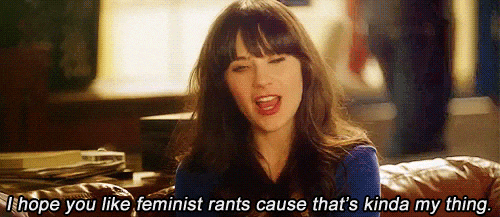A few years ago, while working on a research project for one of my major classes, I came across a TED Talk given by Chimamanda Ngozi Adichie entitled “We Should All Be Feminists.” This video made quite the impact on my life view. You see, as a young, sheltered, naive woman I knew little about feminism; I was under the impression that feminists were those women who hated men. I quickly learned throughout my college experience that this is not that case.
Society holds men and women to different standards. The way in which we, as a society, raises children into adulthood begins with the very first breath each individual baby takes. Charlotte Perkins Gilman, one of the early female sociologists, states in her book, "Women and Economics,"
“One of the first things we force upon a child’s dawning consciousness is the fact that he is a boy or that she is a girl, and that, therefore, each must regard everything from a different point of view” (Economics, 76).
Everywhere children look they are told what they can and cannot achieve; its written on their clothing apparel, is plastered on buildings in a multitude of ads, and it’s heard in the way in which they are spoken to.
Walk into any children's department around the globe and you will see encouraging messages on shirts made for little boys such as “record breaker” or “strive for greatness.” Girls are not taught the same message; their t-shirts read “cute” or “Mom + Me = Awesome Selfies.” What are we teaching our young girls to strive for? Beauty? To look appealing in photographs? We sure as hell are not teaching them that there is so much more to them their bodies.
Walk down any major avenue and on every building, there are ads for perfume, clothing, jewelry and more, depicting young women in a scandalous light; take this ad for example.
This ad by Skyy Vodka is depicting something called objectification and it, just like uninspiring messages on T-shirts, teaches little girls that they are nothing more than a body; and a body to be conquered and controlled at that. This particular instance of objectification depicts women as individuals who are willing to throw away their self-worth for a drink. Objectification is supremely damaging to women and society as a whole. Women begin to feel constantly scrutinized and in turn, they eventually scrutinize themselves leading to the damaging effects of depression, the deterioration of one's self-worth, waist cinching, and plastic surgery among others. Some young girls have even begun to wrap their thighs tightly in plastic wrap in order to achieve a thigh gap that is so desired by our society.
In the home and at school, boys are spoken to less sternly, because let’s face it, “boys will be boys.” Because of this statement, boys are given more attention in every level of schooling from pre-k through undergrad, they’re allowed to dominate conversations never allowing a female to speak her mind or share an opinion, and in the home, they’re given the most freedom. Giving males a free pass through life and females no attention to foster their intellect or freedom to discover what this world has to offer, instills into society that females are incompetent and need the permission of their guardians, whether that be their parents or their husbands, to make it through life.
Is it so hard to believe that we have the same capabilities as men to succeed in the home and the workplace by making our own decisions?
In “We Should All Be Feminists” Chimamanda Ngozi Adichie states “we teach girls to shrink themselves; to make themselves smaller. We say to girls, you can have ambition, but not too much. You should aim to be successful, but not too successful otherwise you will threaten the man…because I am female, I am expected to aspire to marriage. I am expected to make my life choices by keeping in mind that marriage is the most important…Why do we teach girls to aspire to marriage and we don’t teach boys the same?…We police girls…We teach girls shame…Culture does not make people, people make culture. We must make the full humanity of women our culture.”
Feminism is not about hating men or the thought that women should rise above men in any sense of the word. Feminism is about equality between the sexes; equality socially, politically, and economically. It’s about the right to control our own bodies. It’s about removing the glass ceiling and the wage gap. Women have always "held the place of a preposition in relation to man. She has been considered above him or below him, before him, behind him, beside him” (Man Made World by Gilman, 17) but never next to him on equal ground.











 man running in forestPhoto by
man running in forestPhoto by 










